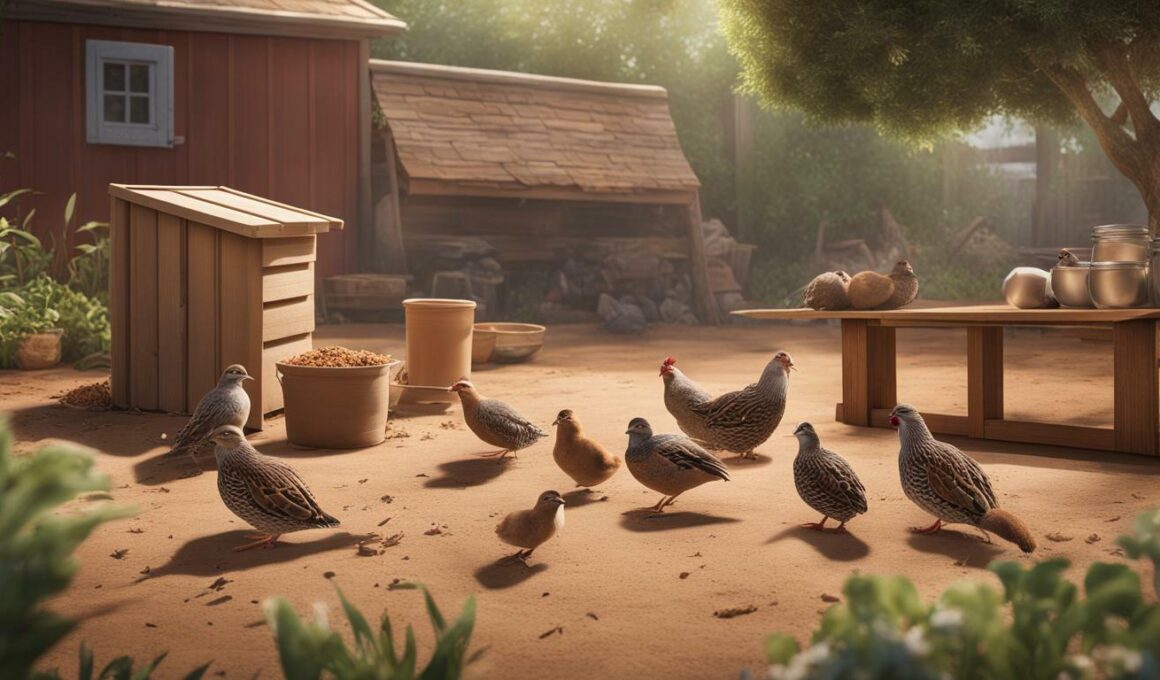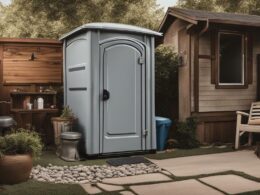If you’re looking for a sustainable source of delicious eggs and meat, raising quail in your backyard might be the perfect solution. Not only are quail relatively easy to care for, but they also require less space than other poultry and can thrive in a suburban or urban setting.
With a little bit of planning and effort, you can start your own backyard quail farm and enjoy fresh, nutritious eggs and meat right at home. In this article, we’ll show you the basics of backyard quail farming, from choosing the right breed to providing suitable housing and nutrition for your quail.
Post Summary:- Backyard quail farming is a sustainable way to produce eggs and meat at home.
- Quail require less space than other poultry and can thrive in suburban or urban settings.
- This article will provide step-by-step instructions on how to get started with backyard quail farming, including choosing the right quail breed and providing suitable housing and nutrition.
Getting Started with Backyard Quail Farming
If you’re new to backyard quail farming, don’t worry! With a little planning and preparation, you can have a successful quail farm right in your own backyard. Here are some key steps to get started:
- Choose the right breed: Quail breeds vary in size, temperament, and egg-laying abilities. Some popular breeds for backyard quail farming include Coturnix, Bobwhite, and California Quail. Consider your goals for raising quail and research which breed fits your needs.
- Obtain quail chicks or eggs: You can purchase quail chicks or eggs online or from a local breeder. If starting with chicks, be sure to provide them with a heat lamp and keep them indoors until they are old enough to move to the outdoor coop. If starting with eggs, use either an incubator or a broody hen to hatch them.
- Set up a suitable quail coop: The coop should provide protection from predators, good ventilation, and easy access for cleaning. You can purchase a pre-made coop or build your own. Be sure to allow for at least one square foot of space per quail.
- Ensure proper care and nutrition for the quail: Quail require a balanced diet of commercial feed, fresh greens, and insects. They also need access to clean water at all times. Regular cleaning of the coop and monitoring for signs of illness or injury are also important.
With these steps in place, you’re well on your way to enjoying the benefits of fresh quail eggs and meat right from your own backyard!
Designing a Quail Coop for Your Backyard
If you’re planning on raising quail in your backyard, it’s important to create a suitable living environment for them. A properly designed quail coop can make all the difference in ensuring your quail stay healthy and happy. Here are some factors to consider when designing your quail coop:
| Factor | Considerations |
|---|---|
| Size | Your quail coop should be spacious enough to accommodate your quail’s needs. A good rule of thumb is to provide at least 1 square foot of space per quail. |
| Ventilation | Proper ventilation is crucial to maintaining good air quality within the coop. Ensure that there are enough openings for fresh air to circulate, but not so many that it gets too drafty for your quail. |
| Flooring | Choose flooring that is easy to clean and has good drainage. You can use materials such as wire mesh, gravel, or sand. Avoid using wood or other absorbent materials that can harbor bacteria. |
| Lighting | Quail require light to lay eggs, so ensure that the coop has adequate lighting. You can use natural lighting or install electric lights to provide a 14-16 hour lighting period per day. |
| Nesting Boxes | Provide nesting boxes for the quail to lay eggs. Each box should be 8-12 inches in diameter and filled with clean straw or shavings for insulation and comfort. |
| Predator Protection | Quail are vulnerable to predators such as raccoons, snakes, and birds of prey. Ensure that the coop is secure and has a sturdy fence or wire mesh to prevent predators from getting in. |
By considering these factors, you can create a comfortable and safe living space for your backyard quail. Remember to regularly clean the coop, provide clean water and food, and monitor your quail’s health to ensure they are thriving in their new home.
Feed and Nutrition for Backyard Quail
Proper nutrition is essential for the health and productivity of your backyard quail. Commercial quail feed is a convenient option and provides your birds with the necessary nutrients for egg production and growth. Look for feed that is specifically formulated for quail, and avoid feeding them chicken feed, which doesn’t meet their nutritional needs.
Tip: While commercial quail feed is ideal, you can supplement your quail’s diet with fresh greens, fruits, and insects. This can help to provide additional nutrients and prevent boredom. Make sure to avoid feeding them anything toxic or harmful, such as avocado or rhubarb.
| Food Type | Amount |
|---|---|
| Quail feed | Free choice |
| Greens and fruits | 10-15% of diet |
| Insects | 10-15% of diet |
Make sure your quail have access to clean, fresh water at all times. Birds that are dehydrated may stop laying eggs or have difficulty walking. You can use a gravity-fed waterer or a small dish that is easy to clean and refill.
Tip: Be aware that waterers can sometimes get dirty or contaminated with droppings. Check them daily and clean them as needed to prevent health issues.
If you notice that your quail are not eating or drinking, it may be a sign of illness. Other signs to watch out for include lethargy, ruffled feathers, or abnormal droppings. If you suspect that your birds are sick, consult with a veterinarian who has experience with poultry.
Maximizing Quail Egg Production
As a backyard quail farmer, one of the most rewarding benefits is the production of fresh and nutritious quail eggs. Whether you are raising quail for personal consumption or as a small business, maximizing egg production is a top priority. Here are some tips for increasing your quail’s egg-laying potential:
1. Provide Adequate Lighting
Quail require at least 12-14 hours of daylight to stimulate egg production. If your coop is in a shaded area or does not receive enough natural sunlight, consider providing artificial lighting to supplement their needs. A simple timer switch can be used to control the light and ensure consistency.
2. Maintain Optimal Temperature
Quail prefer a temperature range between 60-75°F for optimal egg production. Fluctuations in temperature can cause stress on the quail and reduce their egg laying potential. It is important to insulate your coop and regulate temperature using heating or cooling methods as necessary.
3. Collect Eggs Frequently
Collecting eggs frequently not only ensures freshness but also stimulates the quail to lay more eggs. Providing clean and comfortable nesting boxes also encourages the quail to lay eggs in a designated area, making it easier for you to collect and monitor egg production.
4. Store Eggs Properly
It is important to store quail eggs properly to maintain their freshness and quality. Keep them in a cool and dry place, and avoid washing them as this can remove the natural protective coating on the egg shell. If storing for an extended period, it is recommended to turn the eggs daily to prevent the yolk from sticking to the shell.
5. Address Potential Health Issues
Stress, disease, and inadequate nutrition can all affect egg production in quail. It is important to monitor your quail’s health and provide proper care and nutrition to prevent these issues from arising. Regular cleaning, proper ventilation, and a balanced diet are essential for maintaining the overall health and well-being of your quail.
By following these tips, you can ensure a steady and abundant supply of quail eggs from your backyard flock. Just remember to provide them with the necessary care and attention, and enjoy the delicious and nutritious rewards of your efforts!
Providing Suitable Housing for Backyard Quail
When it comes to providing housing for your quail, there are several factors to consider. The type of housing you choose will depend on your personal preferences, the size of your flock, and the space you have available. Here are a few options to consider:
A Quail Coop
A quail coop is a popular option for backyard quail farmers. It provides a safe and secure environment for the birds and allows for easier egg collection. When designing your quail coop, consider the following:
| Consideration | Details |
|---|---|
| Size | Ensure the coop is large enough to comfortably accommodate your birds with enough room to move around and perch. A general rule of thumb is to allow for at least one square foot of space per bird. |
| Ventilation | Proper airflow is essential for preventing moisture buildup and ensuring fresh air for the birds. Include vents or windows to allow for proper circulation. |
| Flooring | Choose flooring materials that are easy to clean and sanitize. Options include wire mesh, plastic or metal trays, or solid floors covered in bedding. |
| Nesting Boxes | Include nesting boxes for the quail to lay their eggs. Aim for one nesting box per three to four birds. |
| Predator Protection | Make sure the coop is secure and predator-proof. Consider adding features such as wire mesh, locks, or an enclosed run. |
Other housing options to consider include aviaries or tractors, which allow for more mobility and free-ranging opportunities for the birds. Whichever option you choose, make sure it provides a safe and comfortable living environment for your quail.
Are the Basics of Raising Quail Similar to Raising Ducks in Your Backyard?
Raising ducks in backyard requires different considerations compared to raising quail. While both can be kept as pets, ducks need more water for swimming and feeding, whereas quail can thrive in drier conditions. Additionally, ducks tend to require more space and produce more waste. However, both can be enjoyable and rewarding experiences for backyard enthusiasts.
Health and Wellness for Backyard Quail
Keeping your backyard quail healthy is essential for their well-being and productivity. By following some basic guidelines, you can ensure your quail stay healthy and happy.
Common Health Issues
Quail are generally hardy birds, but they are susceptible to some common health issues. These include:
- Coccidiosis: a parasitic infection that affects the digestive system
- Respiratory infections: caused by bacteria or viruses
- Mites and lice: external parasites that can cause itching and feather loss
By keeping your quail’s living environment clean and dry, you can prevent many health problems. Regularly cleaning and disinfecting their coop and changing their bedding can help keep them healthy.
Preventive Measures
You can take several preventive measures to ensure your backyard quail stay healthy:
- Limit stress: Try to keep your quail’s living environment as calm and stress-free as possible. Loud noises and sudden movements can stress them out.
- Proper nutrition: Providing your quail with a balanced diet will help keep their immune system strong.
- Vaccinations: Depending on where you live, there may be vaccines available to protect your quail from certain diseases. Check with a local veterinarian or quail expert for advice.
Signs of Illness
It’s important to check your quail regularly for signs of illness. Signs of illness may include:
- Lethargy
- Loss of appetite
- Weight loss
- Labored breathing
- Diarrhea
- Unusual behavior
If you notice any of these signs, it’s important to isolate the sick bird and seek advice from a veterinarian or quail expert.
Basic First Aid Treatments
You may be able to treat minor injuries or illnesses at home. Here are a few basic first aid treatments:
- Wound care: Clean the wound with warm water and soap, and apply an antiseptic ointment. Cover the wound with a clean bandage.
- Respiratory infections: Provide supportive care, such as warm and humid living environment, and consult with a veterinarian about appropriate antibiotics.
By following these guidelines, you can help ensure your backyard quail stay healthy and happy.
Conclusion
Congratulations, you are now equipped with the knowledge and skills to raise quail in your backyard! By following the steps outlined in this guide, you can provide a safe and comfortable home for your quail while enjoying a sustainable source of eggs and meat.
Remember to choose the right quail breed, set up a suitable coop, provide proper nutrition and care, and monitor the health and wellness of your quail. With dedication and patience, you can maximize egg production and ensure the longevity of your backyard quail farm.
Thank you for reading this guide on how to raise quail in your backyard. We hope you found it informative and inspiring. Now, it’s time to put your new knowledge into practice and start your own backyard quail farm!
FAQ
Q: Can I raise quail in my backyard?
A: Yes, raising quail in your backyard is possible and can be a rewarding experience.
Q: What do I need to get started with backyard quail farming?
A: To get started, you will need to choose the right quail breed, obtain quail chicks or eggs, set up a suitable quail coop, and ensure proper care and nutrition for the quail.
Q: How should I design a quail coop for my backyard?
A: When designing a quail coop for your backyard, it is important to consider factors such as size, ventilation, flooring, lighting, nesting boxes, and predator protection.
Q: What should I feed my backyard quail?
A: Backyard quail have specific nutritional needs. It is recommended to provide them with a commercial quail feed, supplement it with fresh greens and insects, and ensure they have access to clean water at all times.
Q: How can I maximize quail egg production?
A: To maximize quail egg production, you can focus on factors such as providing appropriate lighting, maintaining suitable temperature, collecting eggs regularly, storing them correctly, and addressing any potential issues that may affect egg production.
Q: What housing options are suitable for backyard quail?
A: Backyard quail can be housed in a variety of ways, including traditional coops, aviaries, or tractors. It is important to create a comfortable and safe environment for the quail.
Q: What health considerations should I keep in mind for backyard quail?
A: Health and wellness considerations for backyard quail include preventive measures, recognizing common health issues, knowing the signs of illness, and being prepared to administer basic first aid treatments.









